#Haruka
Text
Sakura haruka from wind breaker can get scammed easily
#wind breaker#sakura#sakura haruka#sakura x reader#sakura haruka x reader#haruka#wind breaker x reader#windbreaker#windbreaker (satoru nii)#wind breaker (satoru nii)
23 notes
·
View notes
Text
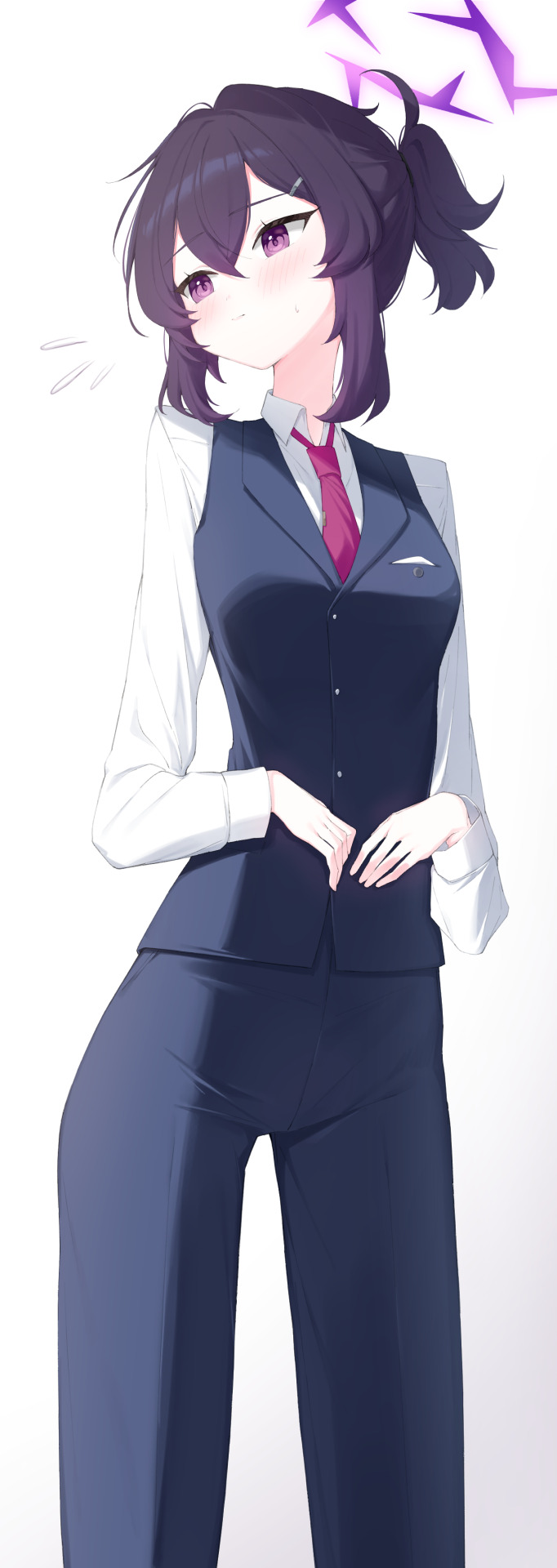
Twitter
Pixiv
Deviantart
24 notes
·
View notes
Text
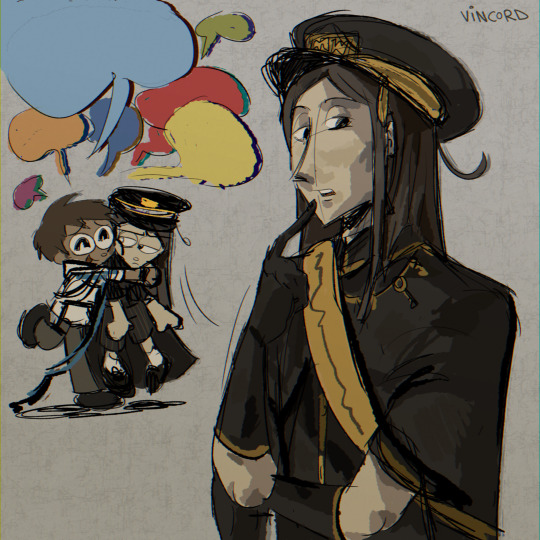
I mean, the warden never makes mistakes, right? (he will only make things worse)
17 notes
·
View notes
Text
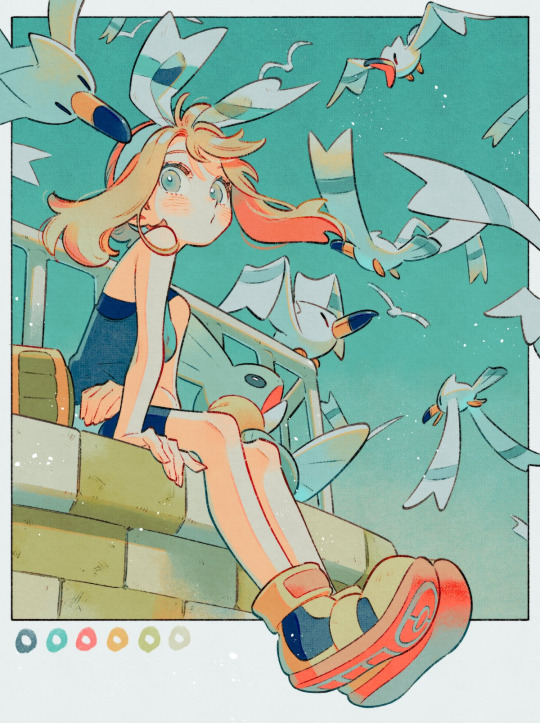
#pokemon#pokémon#may#Wingull#Ruby and Sapphire#gaming#video games#キャモメ#ハルカ#haruka#Omega Ruby and Alpha Sapphire#278#Goélise#갈모매#長翅鷗#Mudkip#ミズゴロウ#258#Gobou#Hydropi#물짱이#水躍魚#ohr cn#oht_cn
4K notes
·
View notes
Text
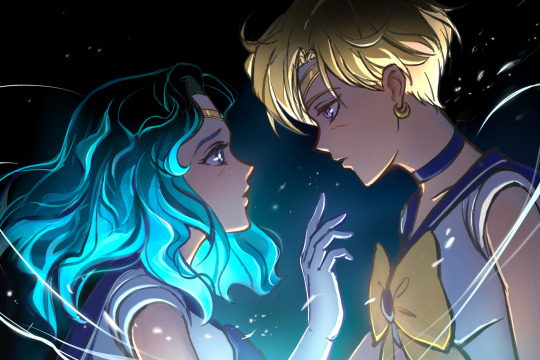
my favorite duo from Sailor Moon 🌊💙💛⚡
#harumichi#haruka x michiru#michiru kaioh#haruka tenoh#haruka tennou#michiru#haruka#sailor neptune#sailor uranus#sailor moon#sailor moon fanart#harumichi fanart#anime fanart#procreate art#my art
2K notes
·
View notes
Text
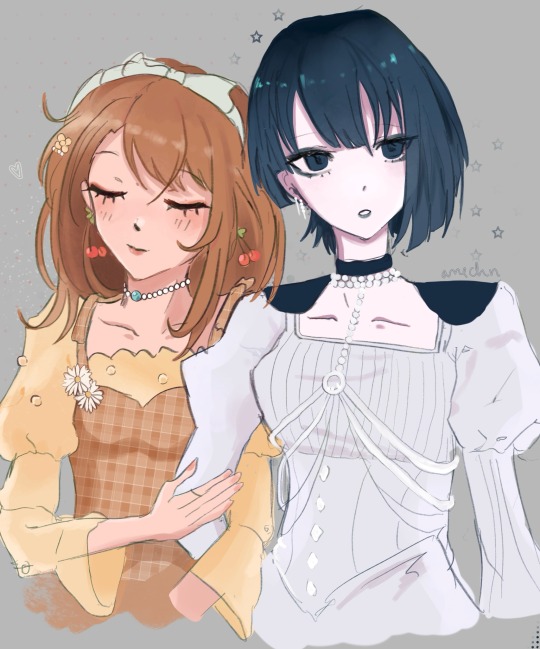
minori haru hehehe 🍓🥛🎸
788 notes
·
View notes
Text
A requiem from thou to thee
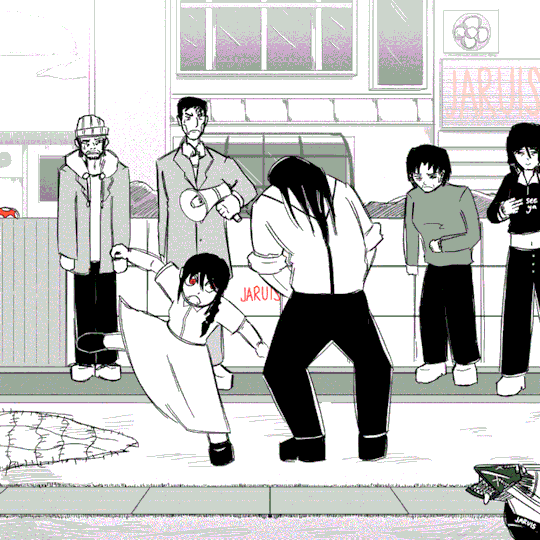
To herd two birds with one Chainsaw Man.
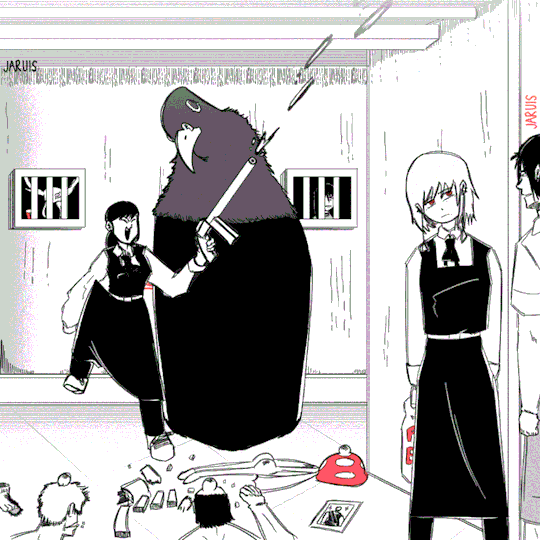
#chainsaw man#nayuta#barem#fumiko mifune#asa mitaka#fami#yoru#chainsaw man 154#csm 154#chainsaw man 158#csm 158#guillotine devil#haruka#miri sugo
603 notes
·
View notes
Text
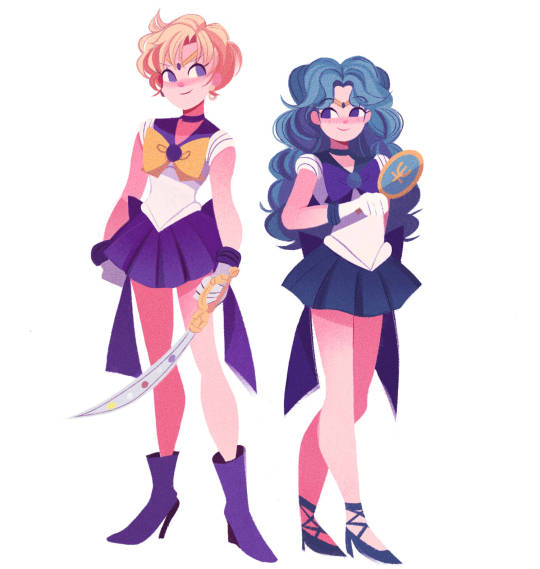
sailor uranus and neptune
#my art#fanart#sailor moon#sailor uranus#sailor neptune#magical girl#mahou shoujo#wlw#haruka tenoh#michiru kaioh#haruka#michiru#haruka x michiru#maho shojo#lineless#lineless art#emily loves cookies
799 notes
·
View notes
Text
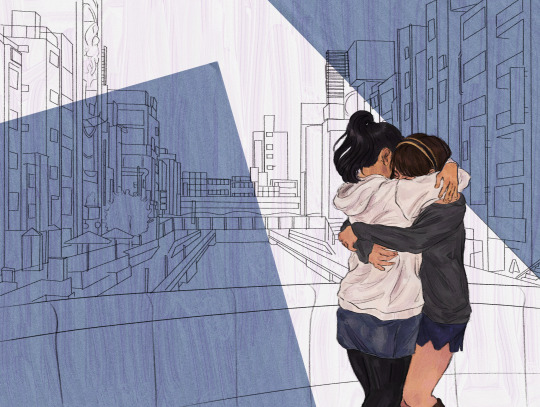
"Friends or not, I want you to know that I still like you, Akari. I like you, and I care about you."
#oouuuu turning them over in my mind...#haruka sawamura#akari natsukawa#yakuza#ryu ga gotoku#rgg#like a dragon#munna's art#haruka#akari#harukari
575 notes
·
View notes
Text


#senran kagura: new link#senran kagura#閃乱カグラ#haruka#xmas#back#big#boots#high heels#swimsuit#official art#mypost#mypost:senran kagura
396 notes
·
View notes
Text
Haruka isn’t autistic-coded – he has an intellectual disability (and why that matters)
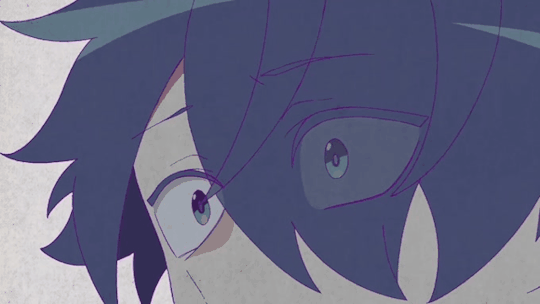
(AO3 Mirror)
A lot of people in the MILGRAM fandom (especially English-speaking MILGRAM fandom) state that Haruka is autistic-coded, as if it’s fact. Most recognize that Haruka is coded as disabled. (If you didn’t recognize that, I hope this post will help to explain why.) However, to state that he is coded as autistic specifically is incorrect. Haruka is coded as intellectually disabled.
Now, there are likely two things that contribute to this issue. One is the invisibility of intellectual disability as a whole, and another is the fact that a lot of this has to do with things that only someone who speaks Japanese would understand (such as complex vs non-complex words in Japanese).
In this post, I plan to lay out what an intellectual disability is and how it differs from neurodivergencies such as autism or ADHD. After that, I want to discuss the way Haruka speaks and uses words, the symbolism in his MVs, and how this lends to him being coded as intellectually disabled. Finally, I want to discuss why this even matters at all. Because, in truth, viewing Haruka as autistic instead of intellectually disabled leaves the viewer misunderstanding his story in a huge way that seems far too common in English-speaking MILGRAM fandom. So, I hope you listen to what I have to say.
What does it mean to be intellectually disabled?
Confusing autism and intellectual disability (henceforth referred to as ID) is not an issue unique to the MILGRAM fandom. They are quite commonly mistaken for each other, in the same way that autism and ADHD are both commonly mistaken for each other. And for the same reason, too – autism and ID are comorbid. This means that, if someone is autistic, they are more likely to have an ID. For this reason, it makes perfect sense to headcanon Haruka as autistic. I headcanon him as autistic, myself, actually. But, in this post, I’m going to be strictly talking about his coding, not headcanons, and he is very specifically coded with an ID.
So, what’s the difference? In the words of the National Institutes of Health, “Whereas ID is associated with general deficits across developmental domains, ASD is in fact defined by the observation that social communication deficits are particularly impairing.” (Source)
To say this in layman’s terms, autism is primarily characterized by difficulties in social communications. Cognitive abilities in autistic individuals vary, just like with allistic individuals, but the defining features are issues with social interaction and nonverbal communication. Autism by itself effects how effectively one communicates, but not intelligence. On the other hand, ID is a limitation on intellectual functioning, just like the name implies. This causes issues in areas like learning, problem-solving, and abstract reasoning.
A lot of people think ID is a synonym for ‘learning disability’. ‘Learning disability’ is an umbrella term that covers things such as dyslexia and dysgraphia. This isn’t the case. For one thing, ID can be a diagnosis on its own. ID is subdivided into syndromic ID, where intellectual deficits are present with other signs and symptoms, and nonsyndromic ID, where ID is, itself, the diagnosis. Examples of syndromic IDs include fragile X syndrome, and Down syndrome. For another, those with learning disabilities tend to have average to above-average intellectual abilities. Their disorder affects their ability to acquire and process information, but they are still able to learn. In contrast, ID affects the ability to learn at all, as well as affecting development and general function.
ID is a debilitating disorder. Many people with an ID cannot live independently, require help with self-care activities, and have limited communicative abilities. Understanding this – particularly, how ID is often a disability that requires a caregiver – is a key point to understanding Haruka as a character. But that’s to be covered later.
Words
The reason why this is a problem in the English fandom specifically is because the main thing tipping off the viewer to Haruka’s ID is the way that he speaks.
‘Weakness’, Haruka’s first-trial song, is written entirely in INCREDIBLY basic, elementary-level kanji – mostly hiragana and katakana. In fact, his first-trial song is misspelled in a lot of official releases of the song (‘Weekness’), which is a good way to get the same effect across. This is not the case across all platforms, though, for whatever reason. He also writes, in his trial 1 interrogation, with only that elementary-level kanji; often only one-word answers. The only complicated characters he knows are usually ones that mean something along the lines of, “I’m a stupid, idiot child,” which can be assumed to be because that’s what he has heard his whole life.
While I’m unsure if it is ENTIRELY in this basic kanji, his second trial song and interrogation is at least mostly written like this, as well. At this point, Muu is teaching him how to read and write (or, that’s what’s implied), but, even with that one-on-one attention, he is still speaking like a child most of the time to the Japanese ear.
When he’s forced to use or listen to words outside of this elementary-level kanji, he gets audibly confused, as well. In the AVIOT earbud collab, he has the voiceline, “Pairing seems to be in progress,” but, if you listen, he says “pairing” like it’s a question. (“Pair-ing?”) He doesn’t know the word is an English loanword that isn’t often used in everyday conversation, so he’s struggling to say it.
He also struggles when speaking to Es in his interrogations. He tries to say, “I will acknowledge any falsehood or silence,” but the words used are very advanced in Japanese. As such, he struggles with it, repeating, “False-hood? Si-lence?” Multiple similar exchanges happen in his interrogations, with Haruka misunderstanding words Es uses, and stuttering over unfamiliar words. The implication is that Haruka struggles with higher vocabulary or unfamiliar words, and with speaking and communication in general. He apologizes multiple times to Es for struggling, saying that he is not intelligent as an explanation multiple times. Additionally, in his second trial investigation, he talks about how he could never do the same things as everyone around him. When Es calls him stupid, he agrees. Es even states, “You really have no learning ability whatsoever.” When, mind you, having delayed or slowed learning is, like, the symptom of intellectual disability. It’s quite blatant. (Why is this not fandom consensus yet, again?)
Moving on from the point of how Haruka uses words, we can talk about other forms of word-based MILGRAM media. For example: when introducing himself, he says he thinks he’s 17, which implies that he isn’t actually sure. Additionally, there is lots of evidence for his intellectual disability in his interrogation questions:
He considers it impossible to learn another language
His dream is to ‘live normally’
He states he disappointed his father (not inherently an ID-related thing, but also, makes sense with his coding in mind)
Many answers imply that he’s been unable to live his own life, and he doesn’t really have any aspirations outside of being given attention
Finally, we have the lyrics to his songs. Again, on top of being written in very basic kanji, we have lines like the following, which include repeated themes of needing a caregiver (being ‘hopeless’ by himself), not being able to do what others can do, hating how he was born, and struggling to function. (I have bolded examples that I think are especially apt.)
“Why was I born like this? Why does it hurt so much?” / “Why was I born to be me? Why does it hurt so much?”
“Instead you kept calling me “hopeless” / You never called me by my name / You were always comparing me to someone else”
“If I tried and couldn’t say it, you would get angry at me and say “You’re hopeless”” / “When I tried to understand it, you’ll make that disappointed face again”
“I just wanted to be your good boy” (what did the MILGRAM team want us to think when they included this line? likely that he’s childish or ‘hasn’t grown up’, right?)
“Mommy, look / I’ve done great” (calling her ‘mommy’ instead of ‘mom’ – again, ask what the MILGRAM team wants us to think when they included this)
“If only I could do what anyone else could do”
“It’s enough, I am a “disappointment””
“My life started in a wrong spot”
With regards to his relationship with Muu, he doesn’t understand why Muu using him would be a bad thing, or how she is manipulating him. People with ID tend to have poor judgment, and Haruka not being able to tell the difference and not caring about the difference between negative and positive attention shows this (although his trauma definitely also plays a role).
Finally, we have the trial song titles.
We’ve already discussed how “Weakness” is sometimes alternatively misspelled as “Weekness”, and that is because the title in Japanese is, arguably, misspelled, too. The Japanese title is a play on the phrase jakuniku kyoushoku, which is equivalent to the English phrase, “Survival of the fittest.” More directly, it translates to, “The weak are meat, the strong do eat.” The character for “strong” (kyou) is replaced by “together” (also kyou) – with the implication being that Haruka forgot which version of the word was correct for this situation. This also works to create a pun, of sorts, as this makes the title more like, “The weak are meat, communal eating”, creating an emphasis on the fact that there are more people eating than there are ‘weak people’. There are differing ways to interpret this pun, but one way is to view it as a statement on Haruka’s status as a minority, oppressed (‘eaten’) by the majority.
On the other hand, we have All-Knowing and All-Agony. In Japanese, this song title is Zenchi Zennou, which can be translated as “Omniscient and Omnipotent”, used to describe the Christian God. Once again, we have what we can assume is Haruka misspelling the title, creating a pun. One that is much more on the nose, as the character for “ability” (nou) is replaced with the character for “worry, distress, pain” (also nou).
It seems that the reason why Haruka uses new complicated words (aside from the words meaning “idiot” and the like) in All-Knowing and All-Agony is because Muu is teaching him. It features the more complicated “食” (shoku; food), when we know from Haruka’s 2023 birthday portal that Muu is bringing him meals. It also prominently features Muu’s name, 夢 (yume; dream), which is more complicated, as well.
Imagery
Now, we get on to the non-verbal, more visually-based evidence for Haruka’s ID. Be prepared for a lot more images!
Going back to Muu teaching Haruka how to write: it’s not just clear in his usage of kanji, but also how he writes. Comparing his handwriting, it becomes much easier to read after Trial 2’s start, and his writing is soft and bubbly; much like a teen girl’s writing might be.
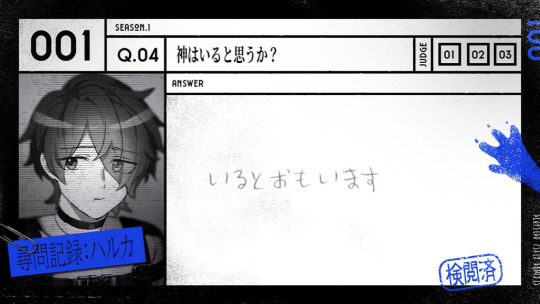

All of these improvements are able to be linked back to Muu (both his style of writing and in the more complicated words that he knows), who we know is looking after him. Considering this, it’s pretty clear why he sees her like a maternal figure.
One of the Minigram comics shows the prisoners eating curry udon together. Of the four shown (Amane, Haruka, Shidou and Mahiru), Amane and Haruka are the only two who make messes out of their clothes. Since the other two characters in the comic have active roles, and Haruka has the most passive one, Haruka’s inclusion can be assumed to be because he is the only prisoner aside from the child, Amane, who would make a mess while eating.

Childish themes and imagery are seen scattered throughout his MV, as well, especially his first one. He draws with the skill level of a child, which is a very prevalent motif, and he is shown to sleep with a plushie.
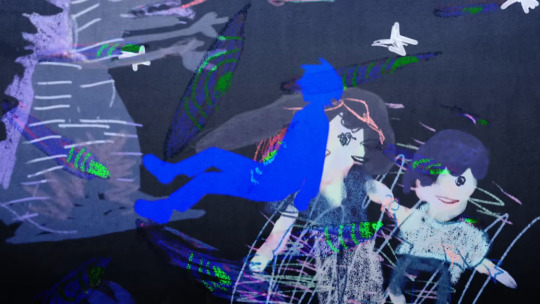
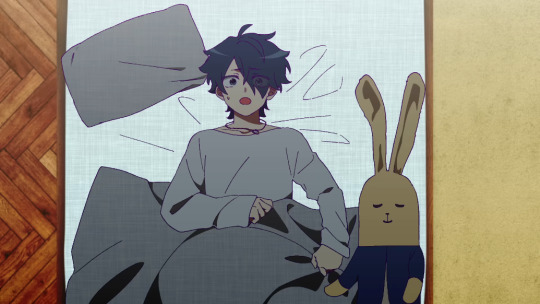
Additionally, he seems to have trouble putting on his clothes. He wears two entirely different socks – not just different colors, but also two different lengths. His pant legs are also two different lengths when he tries to roll them up in his Trial 2 art, and he seems to exclusively wear slip-on shoes up until he befriends Muu (where we can presume that she begins helping him, and even then, they're not done properly).
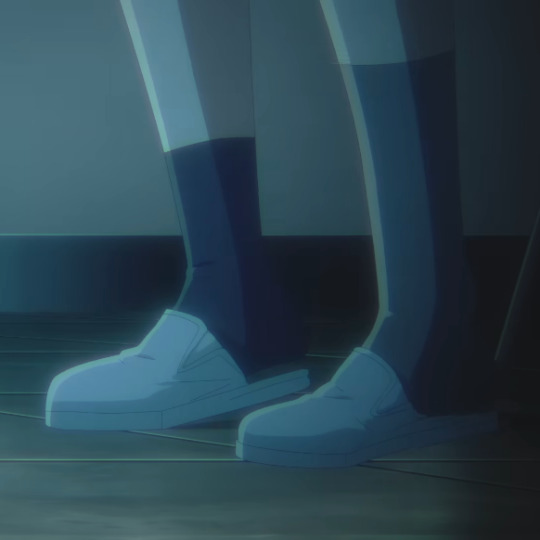

There are various visual parallels drawn between himself as a child and himself as he is now (for example, the way that his clothes are a mix of his current shirt and the vest he wore as a child in All-Knowing and All-Agony), and he often compares himself to a child wanting praise.

Even the violent acts that Haruka is shown committing are also a sign of an ID. People with IDs tend to have meltdowns, and devolve into fits of violence. The reasons for these meltdowns vary depending on the person, but reasons can include anger / frustration (especially in reaction to not being able to communicate well), sensory overload, and confusion.
You may note that Haruka’s mother reacts the exact wrong way for dealing with these meltdowns. When trying to help someone experiencing a meltdown, especially a violent meltdown, the last thing you want to do is appear frightened. The number one piece of advice everyone gives for helping someone experiencing a meltdown is to remain calm. It’s also not advised to leave the person alone, either, because that sends the message, “I want to avoid you when you feel this way.” (Which I suppose, for a neglectful mother like Haruka’s, would be technically accurate, but still not at all helpful.)
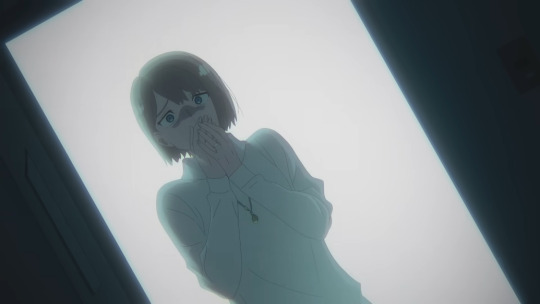
It only makes sense that Haruka’s tantrums continue to get worse and worse.
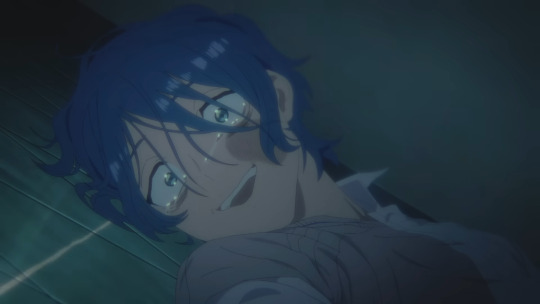
But after the meltdowns fade, he seems to not understand what he’s done. He’s shown experiencing fear and confusion after he hurts something, even shown as his child self at one point. A major part of IDs is being unable to connect actions to consequences.
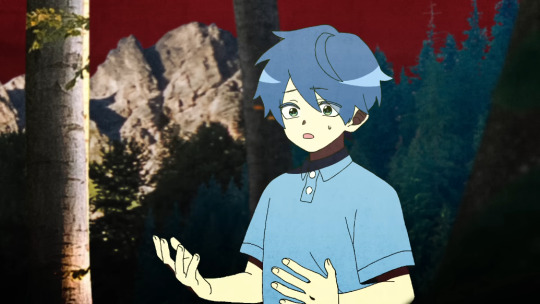


Finally, we go onto his body language. Frankly, I considered putting, “Imagine this as a real person doing these things and not an anime boy, and you’ll see my point.” Which is true. But I decided to go a little more in depth.
Swaying is heavily associated with people with IDs. This is, in part, because people with IDs have reduced postural balance, and general body balance. Because of that lack of postural balance, people with IDs tend to slump quite heavily, as well. Both of these traits are shown very obviously with Haruka, in All-Knowing and All-Agony.

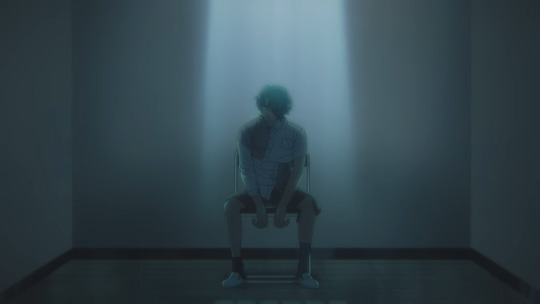
In the same MV, he’s also shown biting his nails. Like autistic people, people with IDs stim, and this could also be a version of hand mouthing (repetitive contact between the hands and the mouth / tongue), which is also heavily associated with / often seen in intellectually disabled people. He's also shown doing this in promo art.
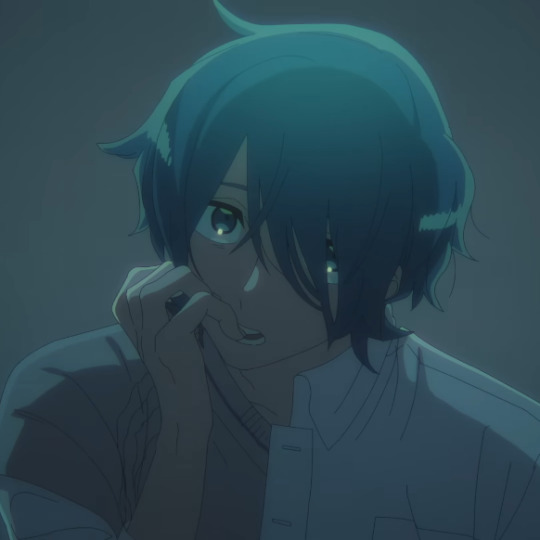
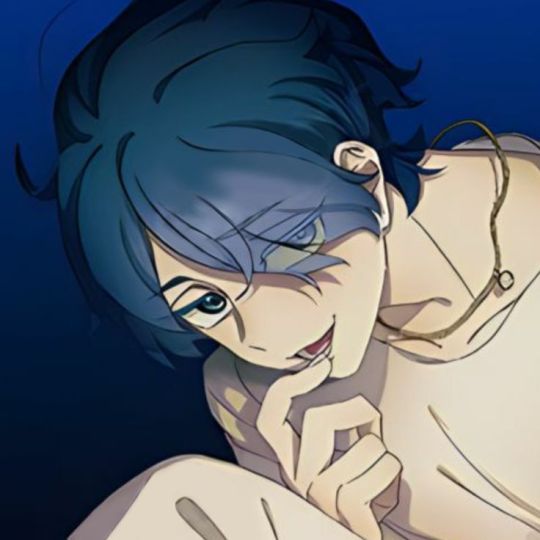
So, why does this matter?
Haruka being intellectually disabled is a huge part of his story, and, when taking it into consideration, it changes how one views his story a lot.
Haruka being treated better as a child makes more sense with this framework. He wants to return to when he was a child because his level of intellect then was seen as more ‘normal’. There wasn’t as much obviously ‘wrong’ with him yet. Children are expected to be a little slow, but it’s when they remain that way that many parents begin to become concerned. He yearns for when his mother didn’t know he was disabled, and when she treated him better for that reason.
Haruka being severely neglected / abused by his mother would be awful, no matter what, but him being intellectually disabled makes it so much worse. He needs attention and care from his caregivers even more so than the average child does, because he has trouble even functioning on the day-to-day without help. This is why he thrives under Muu’s care; she is meeting his support needs. Likely not perfectly (she’s just a teenage girl, and she is almost certainly not trained or educated in this regard), but even with the amount of support that she is able to give, Haruka is thriving. He’s more confident, he’s learning how to write, and he’s eating more consistently.
Without that care, he struggles so severely that he melts down regularly, going into fits of violence over the fact that his support needs aren’t being met (on top of all of the other emotional baggage that comes with any child being neglected by their parent). Haruka’s mother continued to ignore these cries for attention, for help, for care… Until it went too far.
The way that Haruka’s story is viewed changes drastically with this information. If Haruka was autistic, it would affect very few of the things that I listed. So much of Haruka's story hinges on specifically his intelligence level, not how he socializes. And do you have any idea how many people I’ve seen say, “He’s a neurodivergent with a shitty mom, but so am I, and I didn’t kill anyone about it”? No. If you are not intellectually disabled, you do not get to compare your experiences as if they are equal. If you don’t have an ID, your experiences cannot be compared in this way.
Haruka has a debilitating disability that requires support which he was not getting. He was experiencing ableist abuse at the hands of his mother, and he didn’t know how to handle it. All of his violence happened during his meltdowns, and his disability makes it harder for him to connect his actions to the consequences, or find alternate ways to solve his problems – this is all extremely important information and context when you’re discussing whether or not his crime is forgivable.
If you still don’t forgive him, that’s alright. But to neglect this aspect of his character is, to be frank, baffling, if you’re trying to participate in the spirit of the series and understand everyone’s crime to the fullest extent. And to make jokes, comparing your own experiences to Haruka’s, since you assume him to be neurodivergent and nothing else, does a huge disservice to his story! And, when it’s done to demean him? It honestly comes off a slight bit ableist.
So, I’d like everyone to keep this information in mind moving forward. Don’t infantilize Haruka for his disability. But do consider this information in your analysis posts, your discussions, and so on. I’d like to see this become common knowledge in the MILGRAM fandom, especially since the idea of him being specifically autistic-coded is so widespread by this point.
Thank you!

#haruka sakurai#milgram#the milgram project#milgram meta#milgram analysis#intellectual disability#haruka#sakurai haruka#azure does a thing
332 notes
·
View notes
Text
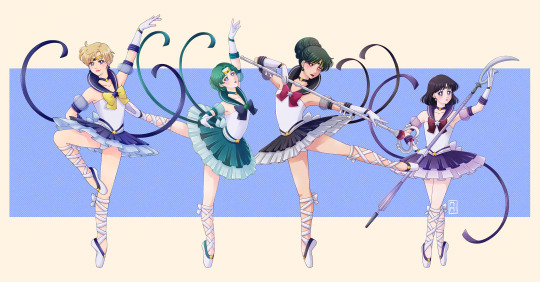
.eternal outer ballerinas
and here are the outers too <3 and i really hope you are not sick of my ballerinas as i still have a few more to show <3
#sailor moon#sailor neptune#sailor uranus#sailor pluto#sailor saturn#haruka#michiru#setsuna#hotaru#anime#fanart#digitalart#ballerina#ballet#outfit#design
329 notes
·
View notes
Text
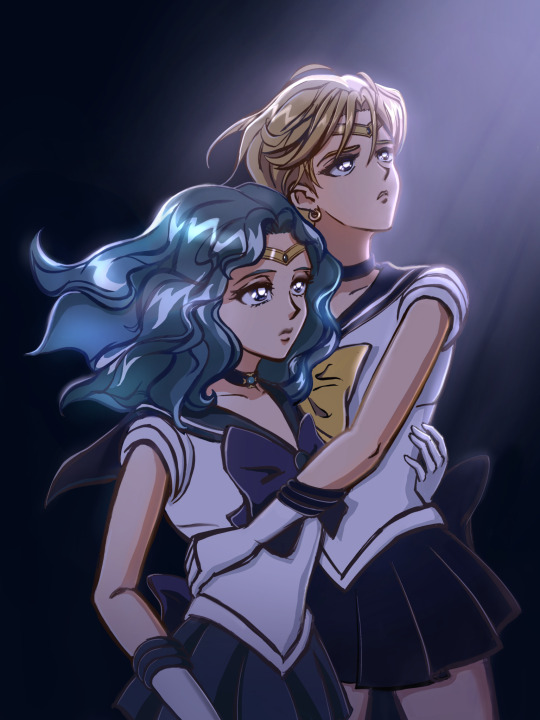
drawing these two gives me peace of mind, especially sketching Michi's hair like ocean waves 😌
#harumichi#harumichi fanart#michiru#michiru kaioh#haruka#haruka tenoh#sailor neptune#sailor uranus#sailor moon#sailor moon fanart#anime fanart#procreate art#my art
231 notes
·
View notes
Text
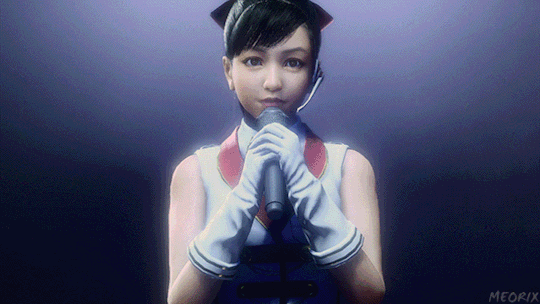

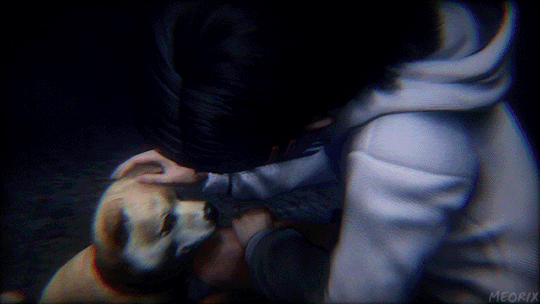
ʜᴀʀᴜᴋᴀ ꜱᴀᴡᴀᴍᴜʀᴀ 27/∞
#haruka sawamura#haruka#yakuza infinite wealth#yakuza like a dragon#yakuza#infinite wealth#ryu ga gotoku#rgg#y8#like a dragon: infinite wealth#mine#edit#my edit#my gif#gamingedit#meorix
188 notes
·
View notes
Text
Let's make the revolution, but let's make it right s’il vous plaît…
Yes I need to take a break but I'm not only tired but I'm fucking autistic so let me say two quick words
I think Haruka is a character worth exploring, and that he's deeper than the comic relief he seems to be, because I think he's a very good representation of adolescence.
Yoshida doesn't live his adolescence as a public hunter, Asa almost rejects the experiences because of her social isolation and emotional problems, which implies that they are teenagers but want to carry the weight of suffering like adults.
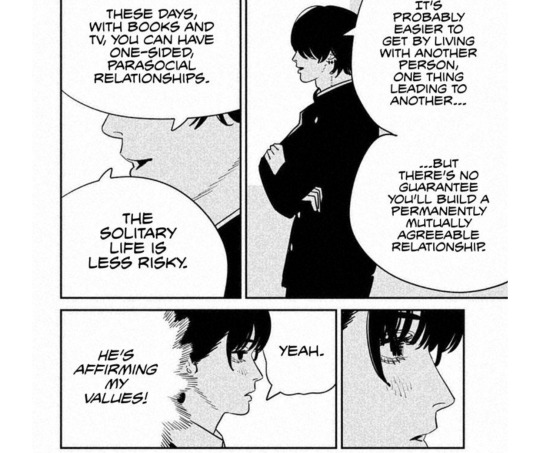
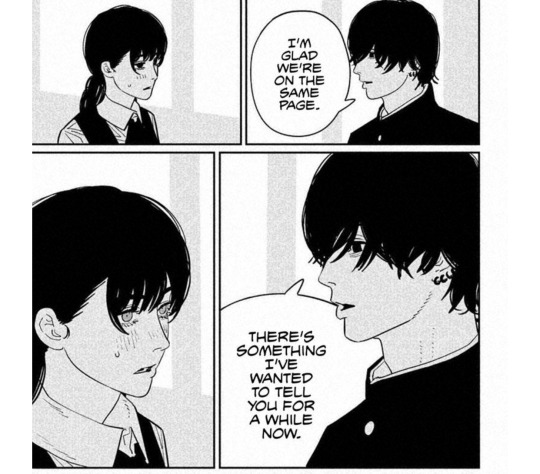
And what is Haruka? The perfect example of the mix between childhood and coming-of-age.
Denji is unable to experience adolescence because he has been deprived of his childhood, or even his humanity, and his interactions lead inexorably to rejection and suffering.
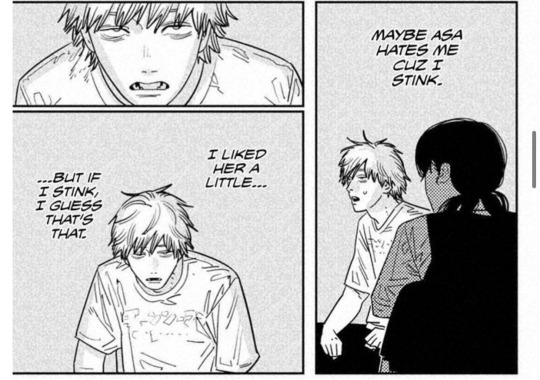
Haruka, on the other hand, is a useful standard by which to compare the other characters' failings in exploring their own adolescence.
Haruka is portrayed as arrogant, but not as negatively pretentious, but as an over-confident teenager, following a role model to the point of pretending to be him, of having a false cable across his chest.
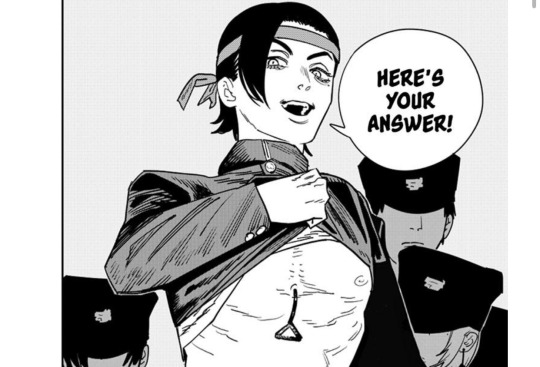
He's also hard on the others, representing those teenagers who never minced their words when pressing Asa's failures, just as he remains deeply human, panicking, relying on his role model to save him.

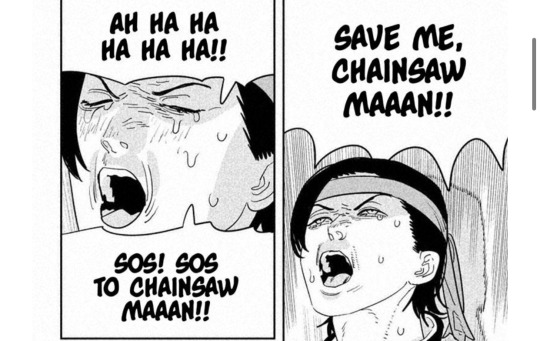
Above all, his typical teenage behavior and funny yet profoundly candid personality are at odds with what adolescence is all about: realizing the world we live in.
If Chainsaw Man is so popular with teenagers, it's first and foremost because he remains anonymous, so everyone can see what they want in his face, but he's also an element of confrontation with the established order.

When I say that Chainsaw Man is a fairly mathematical manga, it's because everything fits together perfectly: if teenagers can make Chainsaw Man an object of protest, or even make it their own design, it's precisely because they don't see Denji behind Chainsaw Man.
If everything finds its balance, it's because the teenagers see in Chainsaw Man something superior, to the point of making him a model, an ideology, while Denji, the boy behind the mask, puts himself in the position of standing outside normality.
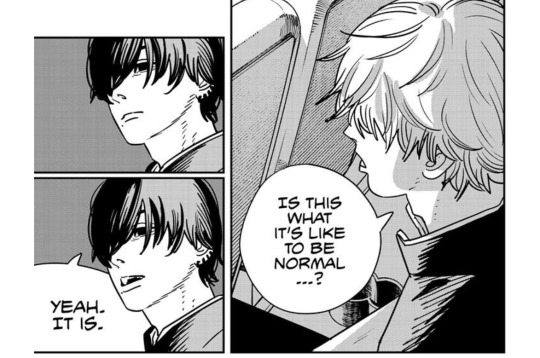
Denji can't belong to normality, since Chainsaw Man's interest is in disrupting the established order, whether it's the dominance of demons or what parents think.
So he's in a position of literal support, since his only point of interaction is to be acclaimed without being recognized.
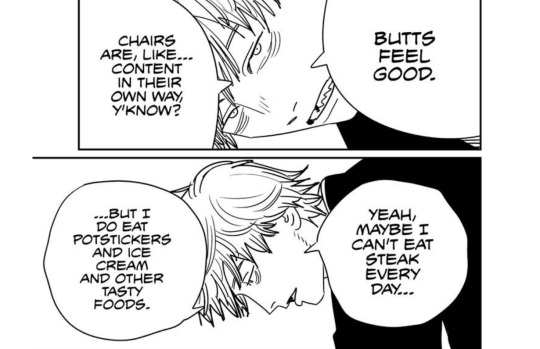
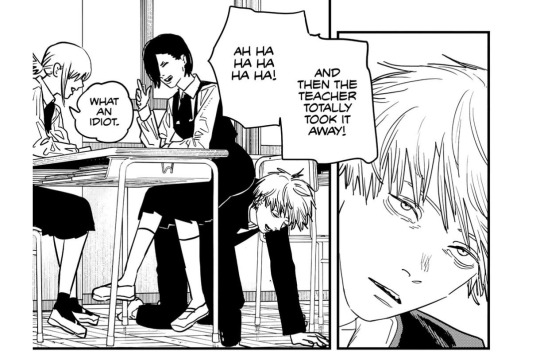
It's interesting that Haruka's here, because he's a Chainsaw Man fan.
Denji has been a figure in the shadows, supporting a teenager in need of guidance in spite of himself.
He was the savior of a humanity prey to demons in spite of himself
But from a more symbolic point of view, Denji is literally dismembered, because carrying this on his shoulders as a teenager, even though his rank is denied, leads not only to exhaustion and withdrawal, but also to a literal breakdown.

It's as if the chair has just cracked... then the adolescence that stood over it also collapses...
People love Denji with difficulty, while he loves them with ease
People adore Chainsaw Man and completely ignore Denji's plight
Teenagers need to see Denji, to see his state of dismemberment, to see every last part of his being instrumentalized.
Because that's what he is, an image from which everyone can pick and choose to see what's missing.
That's why Asa has a missing arm, because she's in the position of a savior who doesn't wallow in her lack and compensate for it with Chainsaw Man, but focuses on the mission of putting him back together.

We repeat: the teenagers have projected themselves into Chainsaw Man as a means of fighting against the established order.
But isn't projecting oneself and being saved by Chainsaw Man precisely what the established order is all about?
Wouldn't it be revolutionary to save a savior who has always asked to be saved? Just as the suffering of the people has been ignored has needed saving
Revolution... represented by what?
Guillotine.
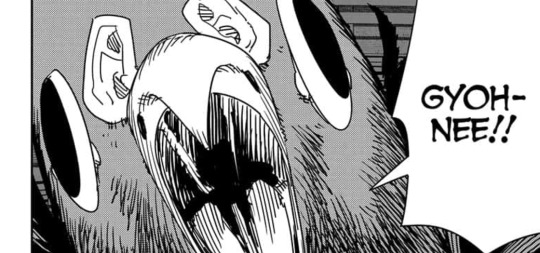
And that's precisely where I find it all interesting, because Haruka effectively compensates with Chainsaw Man in everything he lacks, when he was portrayed completely panicked during the aquarium arc, Denji was serene. Haruka may have a cable on his chest, but he'll never dare pull it.
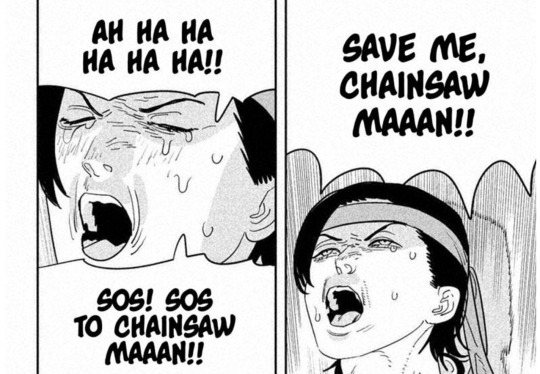
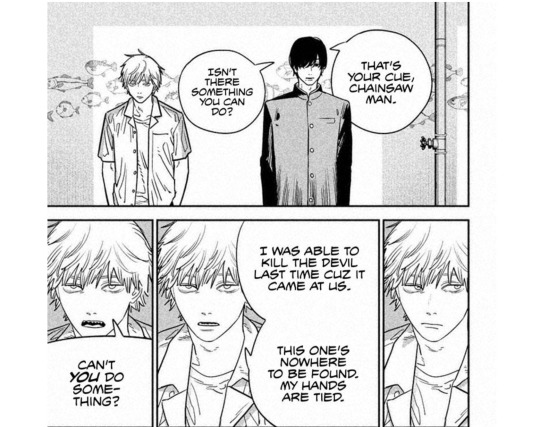
This absence of fear is what keeps Chainsaw Man a machine. Denji has no self-worth, not a little arrogance like Haruka, so he's not afraid of danger. Whereas what constitutes adolescence is precisely the fact of becoming attached, of having things you value and are not afraid of being deprived of.

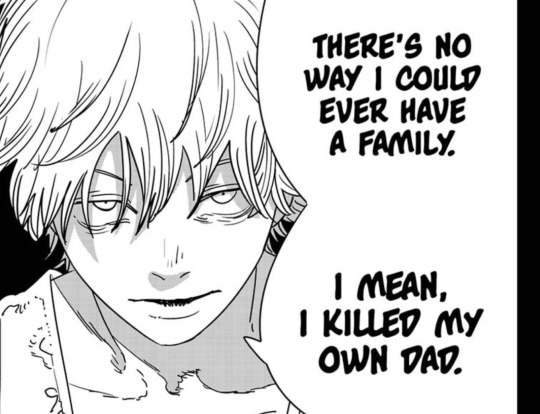
Above all, being an adolescent gives you a protective status, protected by society. So Haruka experiences what Denji experienced: being deprived. Deprived of what he holds dear. Deprived of his status as a child protected to be a terrorist. Haruka is a teenager who needs to be protected, but is now seen as a terrorist, a threat to order.
To be a threat to the established order, while at the same time being guaranteed by it, is the exact ambivalence of what Chainsaw Man is, and what Haruka is experiencing, being in the shoes of his savior in an attempt to save him.
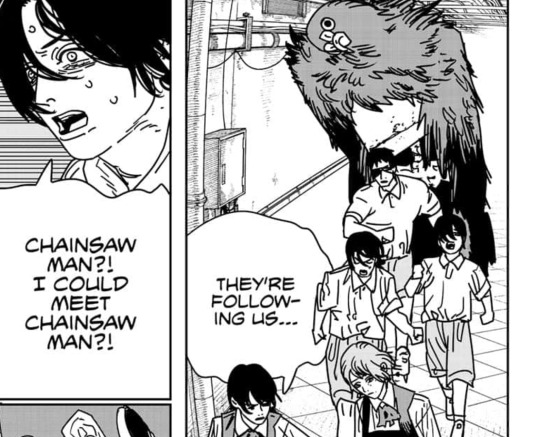
The guillotine demon has an interesting design, a huge bird as a kind of almost inanimate ornament, to emphasize its interior, a piece of skeleton hanging headless.
How does it feel to be close to decapitation? We suffer in anticipation of what we're going to miss: our head, death, the skeleton, and what we're going to leave the world, a body that's missing something.

Just as others must learn to compensate for their own insecurities, Denji must allow himself to feel his own, and instead of accepting suffering, to compensate for it like a human being with his nearest and dearest, his entourage, his family.
Because the right behavior is not to artificially complete oneself by rejecting one's fear and accepting one's suffering, but to accept one's incompleteness in order to be better influenced and completed by others. That's why Denji's loved ones are there to help him, even though he's been cut into pieces.
Just as the teenagers saw in Fami, whom they reject, this guillotine, both reversing the order and focusing on what they lack, poor children in identity crisis.
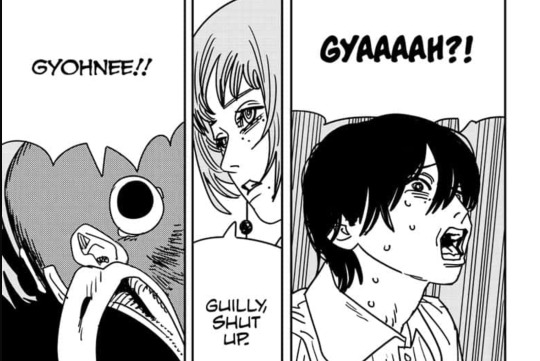
We're in a bit of a pre-French Revolution mood, which I like, so let's embrace it completely by concluding with a quote from one of France's bloodiest revolutionaries, Robespierre:
"First of all, you should know that I am not the defender of the people; I have never claimed that lavish title; I am one of the people, that's all I've ever been, and that's all I want to be; I despise anyone who pretends to be anything more."


To make a revolution not to overthrow the order, but to be a simple, incomplete, imperfect teenager.
#csm spoilers#chainsaw man#csm#csm part 2#csm 158#denji hayakawa#denji#haruka#haruka iseumi#haruka isumi#asa mitaka#fami#nayuta hayakawa#yoru#yoshida#my thoughts#pure analysis#and no theory this time#it feels good!!!!
149 notes
·
View notes
